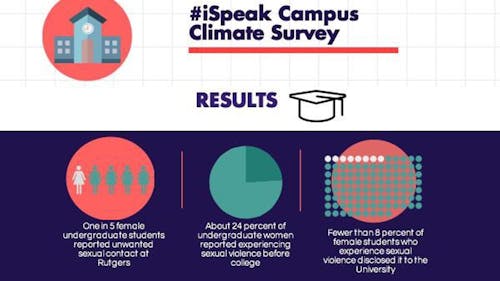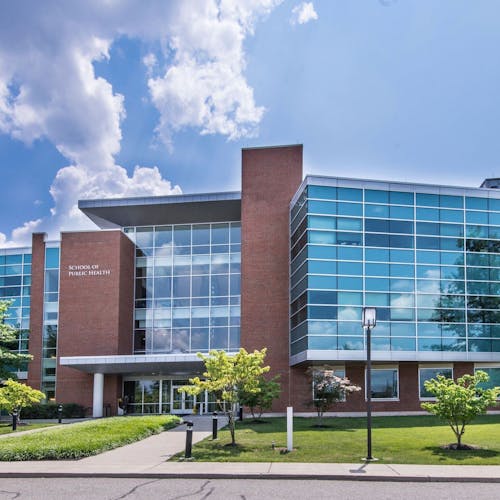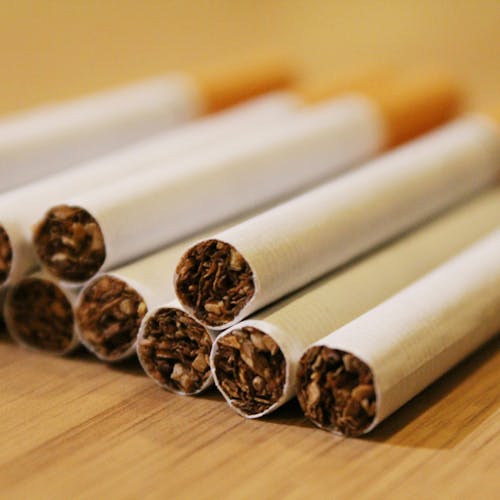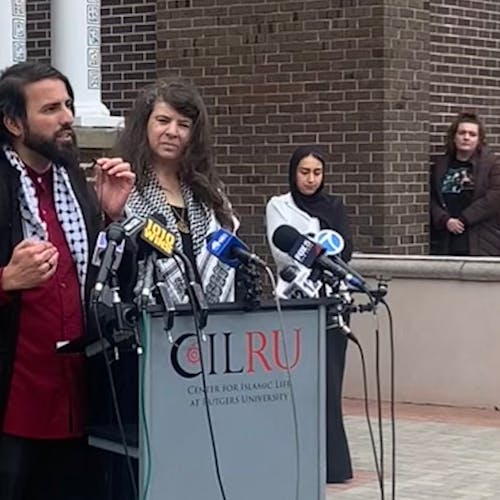STUDY: 20 percent of undergraduate women report unwanted sexual contact while at Rutgers

More than a year ago, the White House aligned with the Center on Violence Against Women and Children at Rutgers University to pilot a new sexual assault climate survey on the New Brunswick campus.
And yesterday, the results of the optional survey were released. The report, titled “iSPEAK Student Experiences, Attitudes, and Beliefs about Sexual Violence," was taken by about 11,000 undergraduate students at Rutgers and uncovered new findings.
The study outlined a number of new statistics:
- One out of five female students reported unwanted sexual contact during their time at Rutgers.
- About 24 percent of undergraduate female students experienced sexual violence before setting foot on Rutgers campus.
- Fewer than 8 percent of female students who experience sexual violence disclosed it to the University.
- About 77 percent of those who were sexually assaulted told a friend.
In response these numbers, the University drafted a new policy regarding unwanted sexual contact. The policy clearly defines all prohibited conduct, the steps for investigating the prohibited conduct and a new affirmative definition of consent. It also states that all Rutgers employees must report all known incidents of prohibited conduct to a Title IX Coordinator.
Vice Chancellor for Student Affairs Felicia McGinty and Associate Director of Center on Violence Against Women and Children offered insight on the report and how the University is responding to the findings in an edited Q&A.
Daily Targum: Twenty percent of undergraduate female students at Rutgers reported unwanted sexual contact during their time here. This goes hand-in-hand with national trends at college campuses. Were either of you surprised by these findings?
McMahon: We used a somewhat broad definition of sexual violence, so the fact that one in five undergraduate women at Rutgers report they have experienced unwanted sexual contact did not surprise me, although it did dismay me. We know that (unwanted sexual contact) has difficult consequences for victims and their friends and the entire campus community.
DT: The report broadly defined “sexual contact." Can you explain the different definitions of sexual contact used in the survey?
McMahon: We had a total of six questions that were asked about unwanted sexual contact since entering college. Four of these questions covered sexual violence involving physical force or threats of physical force and two asked about sexual violence that occurred when the respondent was incapacitated or unable to consent. We asked about incidents that were attempted or completed.
DT: Twenty-four percent of undergraduate women at Rutgers reported experiencing sexual violence before even coming to campus. Do you think there is still work to be done in middle schools and high schools, not just colleges alone?
McMahon: Absolutely. It is a clear indication that sexual violence is an issue beyond the college campus and it is one that affects individuals prior to coming to college. Clearly, we need to be engaging in efforts around education, victim support services, bystander support — all at an early age. I would even say elementary school ...
DT: The report also says 77 percent of undergraduate students who disclosed their sexual assault told a friend. Will Rutgers focus on educating all students on how they should proceed if a friend were to confide in them about a sexual assault?
McMahon: Absolutely. I think that was one of the really important findings of our study because that means we have the opportunity to educate peers and the community about this issue. We can frame this issue as not just for potential perpetrators or potential victims, but something that everyone has a role to play in. In particular, all students need to have the skills, information and confidence to be able to respond to a friend who discloses their sexual assault to get them connected to the resources they need, to respond in a supportive way. Through our bystander intervention education efforts, we can also encourage students to not only support survivors after sexual assault happens, but to learn how to interrupt situations leading to sexual violence to prevent them from occurring in the first place.
DT: The report states that students who don't identify as 100 percent heterosexual had two to three times higher odds of experiencing sexual violence.
McGinty: We are going to be doing targeted work specifically for the LGBT community and other communities that are highly vulnerable. We will be working closely with the Center for Social Justice Education and LGBT Communities. That is on our radar.
DT: Can you detail any efforts that Rutgers is making to combat sexual assault on campus in response to these results?
McGinty: "The Revolution Starts Here. End Sexual Violence Now" is a new year-long campaign led by Student Affairs to address key findings in the #iSpeak climate survey. It is a series of programs and events geared toward helping students have a better understanding of all aspects of sexual violence. For the entire year, we are going to focus on outreach and educational activities to educate our student body so they can support friends who are in crisis, be good bystanders and also know where to go to access resources. That peer knowledge and support is a central part of our campaign. We are also introducing a new website, endsexualviolence.rutgers.edu, to provide resources for sexual violence survivors.
DT: NJ.com reported that Rutgers also plans on updating it's definition of sexual consent to include "it requires clear and unambiguous communication and mutual agreement." Has that happened yet?
McGinty: It has happened. There is now very clear language in our policy that outlines consent. We think that (the definition) will be very helpful to our students. We've also just provided a number of definitions and terms so we are all working with the same understanding when we are talking about these things. (The previous definition) wasn't necessarily faulty, it just wasn't a definition. So we have provided a more explicit definition now.
DT: Were there any biases in the survey that could have affected the results?
McMahon: There are always possibilities of bias with research. We have about a 30 percent response rate. Our analysis shows that those who took the survey pretty nearly match the demographic profile of the larger student body. However, we did have more females participate. That is something that is typical of sexual violence surveys across the country. Our survey was optional. It was not something mandated, so there may have been biases that led certain students to take the survey and others to not. One key finding that we recommended to the White House is that campus climate surveys are not enough. To be meaningful, they need to be linked to an action plan. We have been fortunate enough at Rutgers to have Dr. McGinty's office to be working collaboratively with us. We have Student Affairs working with researchers. Our findings aren't just research, but they are linked to a plan that Dr. McGinty has developed to address all of the findings.



